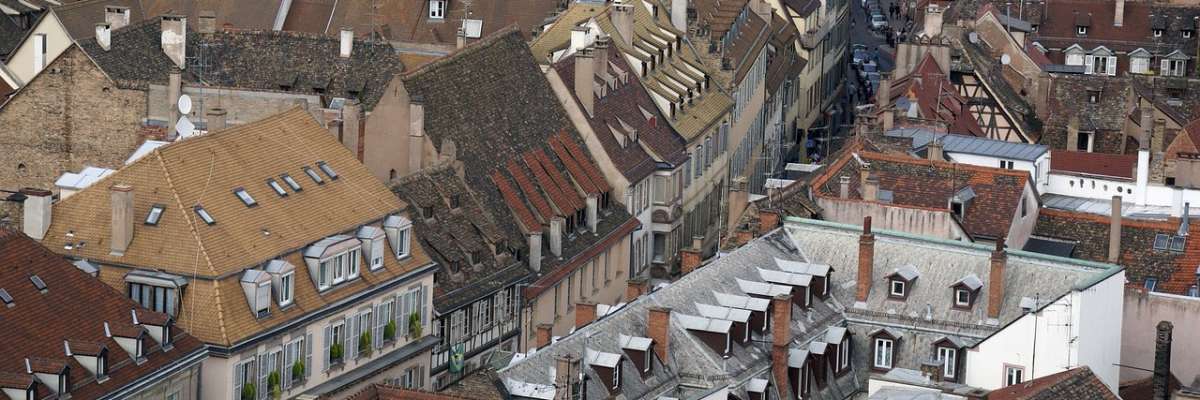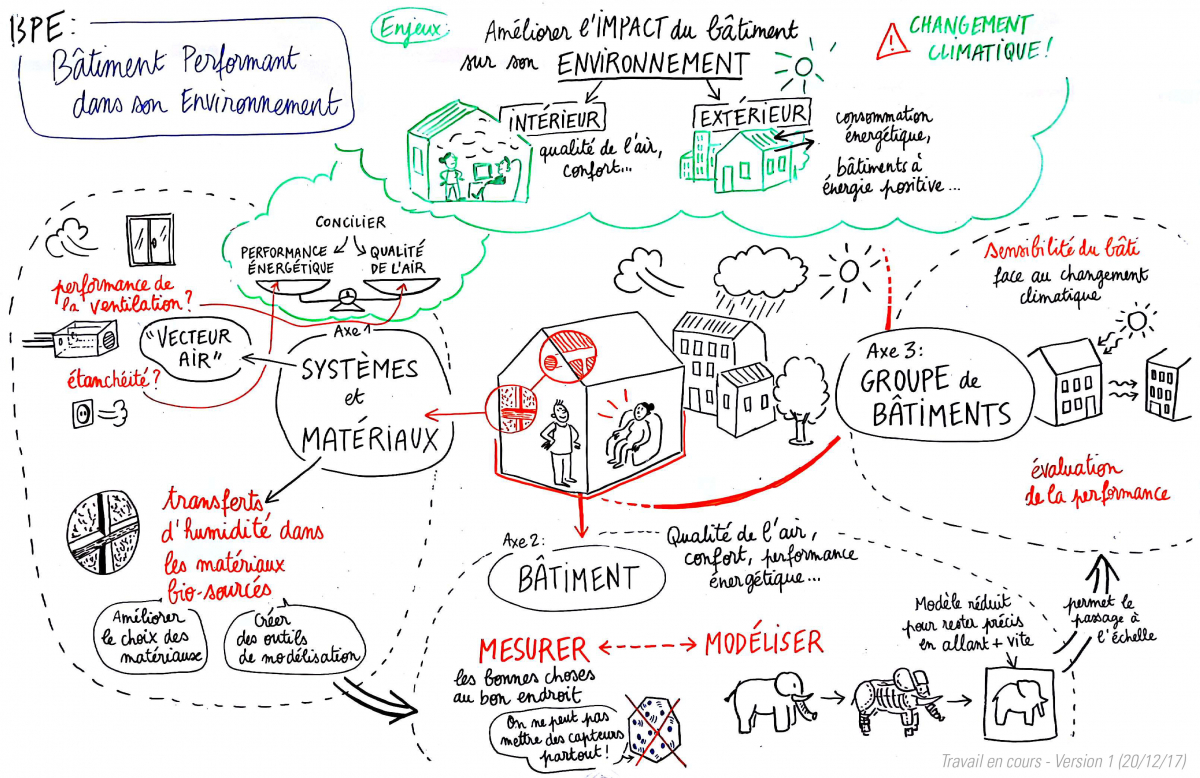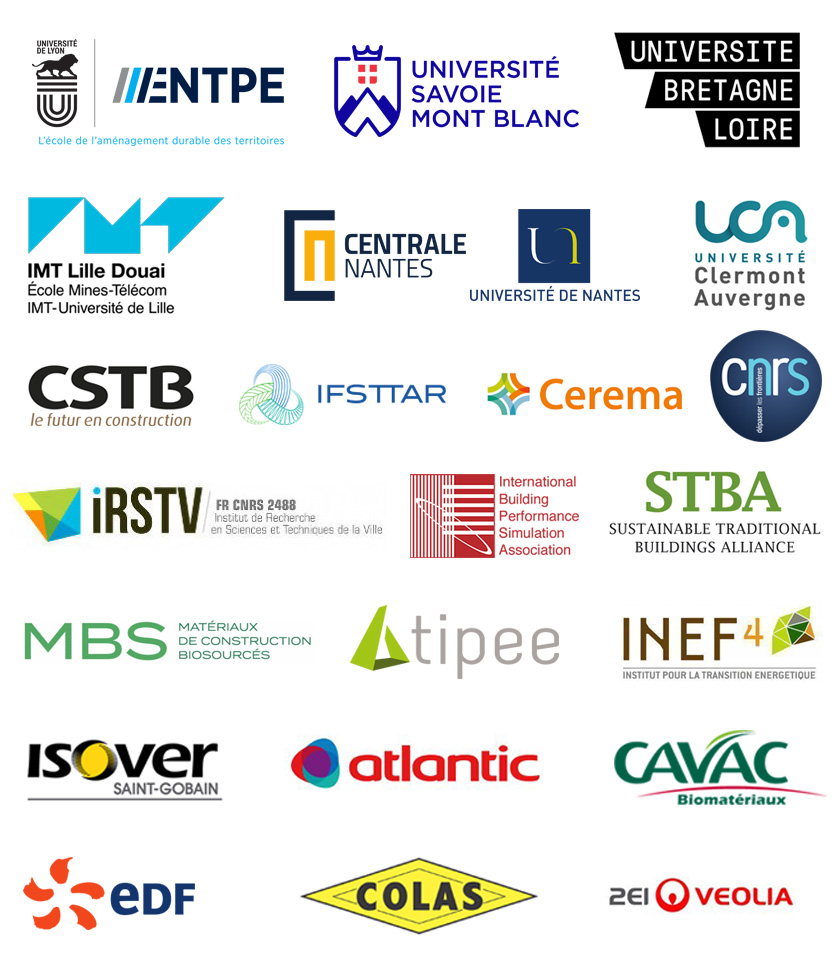
The BPE project team is organised in 3 research areas relating to characterisation of envelope, materials and walls, assessment of the overall performance of the building, and interactions between buildings and urban micro-climates.
Sites : Nantes-Angers, L’Isle d’Abeau, Strasbourg; 17 people involved, including 7 permanent researchers.
In France and in Europe, society is confronted by two contradictory requirements: on the one hand the need to protect the environment, combat climate change and offer all citizens a sustainable living environment; on the other hand the challenge of dealing with the increase in population, and in demand for energy and raw materials due to modern life styles.
France has undertaken to reduce its greenhouse gas emissions by three quarters by 2050. Ambitious policies are being implemented to reduce energy consumption and CO2 emissions in every sector of the economy. The building sector consumes the most energy and produces 23% of national CO2 emissions. It is therefore a key sector in the energy transition. However, to tackle this sector it is necessary to take into consideration a complex system. Its life cycle involves a large number of players (construction industry, property owners, users) and the context is constantly changing (increasing density, climate change, peaks in pollution…). These factors must be taken into account to avoid ending up with solutions that are ineffective or even counter-productive.
Many different research and innovation activities are in progress. They have already succeeded in taking up the successive challenges laid down by thermal regulations, and today they are striving to anticipate and exceed the next regulations for 2020. Within this timeframe, Energy Plus Buildings should become the norm for new-build. Effective design is necessary to achieve this objective, and therefore the architecture and constructive systems must be adapted to the context, consisting of the environment (climate, acoustics, outdoor air quality) and use (comfort, adoption and modifications of the premises). The other quality-related requirements, including the need to provide a healthy environment and to use bio-sourced materials, make progress more complex in this field. For instance, the hygro-thermal characteristics of natural materials are highly variable and less well known. In addition, construction of new buildings only represents a small share of the margin of progress necessary to reduce the total energy consumption associated with a building. Existing building stock will still constitute the majority of built stock in 2050, and represents much greater potential for energy savings. Research is therefore ongoing to find renovation solutions for these buildings. There are four challenges: to achieve energy performance targets, to protect the initial building, to take account of the architectural and heritage aspects, and to improve the quality of the indoor environment. Appropriate solutions must be chosen for each type of building (construction method, materials, systems…).

The BPE team is focusing its research efforts on:
- Elements of buildings (envelope, systems and bio-sourced materials) and their overall performance as an integral part of the building, therefore taking into account interactions linked to local conditions and uses;
- Assessment of the overall real performance in an approach that ranges from the building in its context to a group of buildings (major property assets, urban islands or districts, including those that are “energy plus”…).
In these two areas of research, particular attention will be paid to two cross-sectoral dimensions:
- Consideration of modifications of uses due to the environment quality of spaces;
- Consideration of local climate conditions and climate change in changes in energy consumption behaviours and in the quality conditions of indoor environments.
For research area no.1 (characterisation of envelope, materials and walls), the main expected results are as follows:
- Method for on site identification of a wall’s hydric and thermal properties;
- Database of hygro-thermal characteristics of bio-sourced and geo-sourced materials;
- Hygro-thermal models on the wall scale (1D, 2D) optimising the computation time so that they can be combined with a building model;
- Methods and recommendations for implementation of hygro-thermal simulations (consideration of capillary rise, convective effects on humidity transfers, etc.);
- Methods for on site characterisation of real performance of ventilation and airtightness of sealing systems in buildings;
- Database of performance levels for air permeability of the envelope and the ventilation networks.
For research area no.2 (Assessment of overall building performance), the main expected results are as follows:
- Characterisation of measurement uncertainty or non-measurement of all parameters linked to energy performance;
- Demonstration of use of modelling by measurement to assess the energy performance of buildings;
- Scale models of buildings in order to represent a set of buildings;
- Capability to design building ventilation according to overall performance objectives, in particular by better assessing the impact of air permeability.
For research area no.3 (interactions between buildings and urban micro-climate), the main expected results are as follows:
- Implementation of inclusion of urban climate conditions in a building thermal simulation tool used in operational practice;
- Proposal of a model validation protocol making the link between buildings and urban climate and validation of our models (preparation and management of a European or international project on this subject);
- Implementation of a model capable of simulating a set of buildings and taking into account its urban climate context.

- Public sector training bodies: ENTPE, Université de Savoie Mont-Blanc, CSTB, Institut Mines Telecom Lille-Douai, Université Bretagne Loire, Ecole Centrale de Nantes, Université de Nantes. Université Blaise Pascal (Clermont-Ferrand).
- EPST: CSTB, IFSTTAR, CNRS
- GDR FR associations Technological platforms: Urban science and technology research institute & GDR currently preparing modelling of transfers in a building (coord. M. Woloszyn), IBPSA association, STBA (Sustainable Traditional Buildings Alliance), GDR MBS (Bio-sourced construction materials - coord. S. Amziane, C. Lanos & S. Marceau).Tipee, INEF4.
- Industrial partners: ISOVER, Atlantic, Cavac Biomatériaux, EDF, Colas, Veolia 2EI...
Lists and no. of doctoral schools:
- ED 72 Engineering Science (SPI) at Université Lille Nord de France
- ED 162 Mechanics, energy, civil engineering, acoustics (MEGA) at Université de Lyon
- ED 489 Science and engineering of systems, the environment and organisations (SISEO) at Université de Savoie Mont-Blanc
- ED 602 Engineering science (SPI) at Université Bretagne Loire.
Participation in scientific societies / technical associations / scientific councils:
- Marjorie MUSY is coordinator of the City and Building working group for energy action at the CNRS. Marjorie MUSY is a member of the 7 Alliance ANCRE working group, Plante et Cité, of the INEF4 (energy transition institute scientific council).
Merveil Muanda Lutete (2021-2024). Évaluation des mesures d'adaptation de l'environnement urbain aux contraintes du réchauffement climatique
Hostein Mathilde (2021-2024). Évaluation de l'impact du changement climatique sur le confort thermique des bâtiments en tenant compte du comportement des occupants et du contexte urbain - Application aux stratégies passives d'amélioration du confort thermique d'été.
Jordan Gauvrit (2017-2020)
Utilisation des méthodes auto-régressives pour le couplage mesure-calcul dans le but de l’évaluation de la Performance Énergétique des Bâtiments en site occupé. (Use of auto-regressive models for measurement-computation coupling in order to evaluate building energy performance on occupied sites.) Thesis supervisor: Stéphane Lecoeuche (IMT Lille-Douai) co-supervisor Antoine Caucheteux (Cerema), Doctoral school: SPI Université Lille Nord-de-France.
Kanama, N. (2019-2022)
Prise en compte de l'environnement urbain sur le choix et le dimensionnement des systèmes de ventilation dans les logements. Impact des transferts de pollution de l'extérieur vers l'intérieur du bâtiment. (Consideration of the urban environment when choosing and dimensioning ventilation systems in dwellings. Impact of pollution transfers from the exterior to the interior of the building.) Thesis supervisor: E Gonze, LOCIE, Co-supervisors: G. Guyot, BPE and M. Ondarts, LOCIE. Doctoral school: SIESO, Université Savoie Mont Blanc
Poirier, B.(2019-2022)
Evaluation de la performance globale des systèmes de ventilation intelligent. (Evaluation of overall performance of intelligent ventilation systems.) Thesis supervisor: M. Woloszyn, LOCIE, Co-supervisor: G. Guyot, BPE. Doctoral school: SIESO, Université Savoie Mont Blanc
Rueda, M.J.,(2019-2022)
De l'expérimentation à l'établissement d'un référentiel robuste d'indicateurs pour la qualité de l'air, le confort et l'énergie dans les bâtiments basse consommation monitorés et connectés. (From experimentation to implementation of a robust baseline of indicators for air quality, comfort and energy in monitored connected low energy consumption buildings.) Thesis supervisor: F. Würtz, GE2Lab, Co-supervisor of thesis: E Gonze, LOCIE, Co-supervisors: G. Guyot, BPE and M. Ondarts, LOCIE. Ecole doctorale EEATS, Université Grenoble Alpes.
Yaqubi, O.,(2019-2022)
Méthodologie d'intégration des données du changement climatique dans les outils d'aide à la décision?: application aux cadastres énergétiques et cartes de vulnérabilité liées à l'îlot de chaleur urbain. (Methodology to integrate climate change data into decision support tools: application to energy land surveys and vulnerability maps linked to the urban heat island.) Thesis supervisor: M. Musy, BPE. Co-supervisors: S. Guernouti and A. Rodler, BPE. SPI - Engineering sciences (Nantes).
Adeline Mélois (2016-2020)
Impact du vent sur la mesure de la perméabilité à l’air du bâtiment. (Impact of the wind on measuring air permeability of a building.) Thesis supervisor Mohamed El-Mankibi (ENTPE), co-supervisor Bassam Moujalled (Cerema), Doctoral school: MEGA.
Gabriel Rémion (2017-2020)
Mesure des performances globales in situ des systèmes de ventilation naturelle et hybride dans les bâtiments à faible demande d’énergie. (On site measurement of overall performance of natural and hybrid ventilation systems in buildings with low energy demand.) Thesis supervisor Mohamed El-Mankibi (ENTPE), co-supervisor Bassam Moujalled (Cerema), Doctoral school: MEGA.
Marie-Hélène Azar (2017-2021)
Application de la réduction de modèle pour la simulation thermique à l’échelle de la ville. (Application of scale models for thermal simulation on the scale of the city.) Thesis financed by MENRT. Thesis supervisor Marjorie Musy (Cerema), co-supervisor Sihem Guernouti (Cerema), Doctoral school: SPI Université Bretagne Loire.
Clément Piégay (2016-2019)
Approche conjointe acoustique et thermique pour l’optimisation des laines végétales du bâtiment. (Combined acoustic and thermal approach to optimisation of plant wools for buildings.) Thesis supervisor: Emmanuel Gourdon (ENTPE), co-supervisor Etienne Gourlay (Cerema), Doctoral school: MEGA. http://www.theses.fr/2019LYSET010
Nicolas Lauzet (2016-2019)
Développement d'une méthode de bureau d'études pour la prise en compte du microclimat en phase de conception d'un bâtiment (Development of an engineering firm method to take account of micro-climate in the design phase of a building) - CIFRE thesis with the TRIBU engineering firm, Thesis supervisor: Marjorie Musy (Cerema), Doctoral school: SPI Université Bretagne Loire. http://www.theses.fr/s208194
Balsam Aljib (2018)
Data-driven building thermal modeling using system identification for hybrid systems. Thesis supervisor: Stéphane Lecoeuche (IMT Lille-Douai) co-supervisor Antoine Caucheteux (Cerema), Doctoral school: SPI Université Lille Nord-de-France. http://www.theses.fr/2018MTLD0006
Julien Berger (2014)
Contribution à la modélisation hygrothermique des bâtiments : application des méthodes de réduction de modèle. (Contribution to hygro-thermal modelling of buildings: application of scale model methods.) Thesis supervisor: Monika Woloszyn (Université Savoie-Mont Blanc), co-supervisor Sihem Guernouti (Cerema), Doctoral school: SISEO. https://tel.archives-ouvertes.fr/tel-01127189.
Gaëlle Guyot (2018)
Vers une meilleure prise en compte de la qualité de l'air intérieur et de la santé dans les logements individuels basse consommation : Développement d'une approche performantielle de la ventilation. (Towards taking into account the quality of indoor air and health in low-energy individual housing to a greater extent: Developing a performance-based approach to ventilation.) Thesis supervisor: Monika Woloszyn (Université Savoie-Mont Blanc), Doctoral school: SISEO. http://www.theses.fr/s95076
You have a question ?

